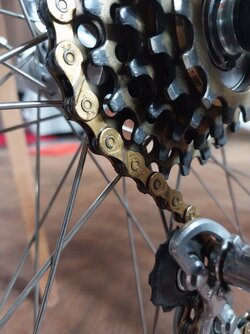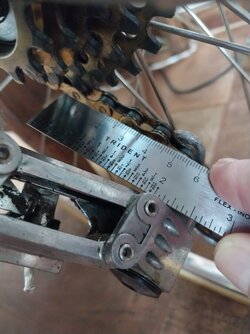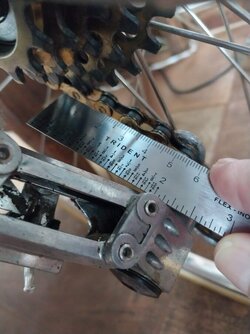You are using an out of date browser. It may not display this or other websites correctly.
You should upgrade or use an alternative browser.
You should upgrade or use an alternative browser.
14-26T 6-speed freewheel with Italian thread
- Thread starter sebinho
- Start date
Page may contain affiliate links. Please see terms for details.
Cycleops
Legendary Member
- Location
- Accra, Ghana
Hen's teeth come to mind. There's only one on the EvilBay and that's an eye watering price.
Yes, indeed. There are Suntour and Shimano 14-26t freewheels there that are affordable. I haven't asked yet what thread these have. If ISO, I think they can be used. There are new Interloc Racing Design (IRD) 13-26t freewheels too with ISO threading. But with import duties to this country, they cost more than I'm willing to pay.Hen's teeth come to mind. There's only one on the EvilBay and that's an eye watering price.
Right now I've got a 5-speed 14-24t freewheel on the bike (the frame/hub fits 6s). I don't live in such a hilly place but an extra 2 teeth would help my knees. My rear derailleur (Campagnolo 980) takes up to 26t apparently.
Last edited:
Ajax Bay
Guru
- Location
- East Devon
Suggest you just get on and use a 'normal' freewheel with ISO thread diameter. It'd be, what, 80 microns different.
I also suggest you'd be fine with a 14(or 13)-28. My Nuovo Record RD copes perfectly well with that (6sp).
Paste from Sheldon below [ https://sheldonbrown.com/freewheels.html ]
All recent freewheels and threaded hubs, regardless of where made, use ISO threading. The older British and Italian standards use the same thread pitch but a very slightly different thread diameter, and are generally interchangeable.
I also suggest you'd be fine with a 14(or 13)-28. My Nuovo Record RD copes perfectly well with that (6sp).
Paste from Sheldon below [ https://sheldonbrown.com/freewheels.html ]
Freewheel Threading
The standard ISO threading for freewheels is 1.375 x 24 TPI, the same as for standard ISO bottom brackets.| Type | Imperial | Metric |
|---|---|---|
| Italian | 1.378" x 24 tpi | 35 x 1.058 mm |
| ISO | 1.375" x 24 tpi | 34.92 x 1.058 mm |
| British | 1.370" x 24 tpi | 34.80 x 1.058 mm |
| French | 1.366" x 25.4 tpi | 34.7 x 1 mm |
| Metric BMX | 1.181" x 25.4 tpi | 30 x 1 mm |
All recent freewheels and threaded hubs, regardless of where made, use ISO threading. The older British and Italian standards use the same thread pitch but a very slightly different thread diameter, and are generally interchangeable.
Suggest you just get on and use a 'normal' freewheel with ISO thread diameter. It'd be, what, 80 microns different.
I also suggest you'd be fine with a 14(or 13)-28. My Nuovo Record RD copes perfectly well with that (6sp).
Thanks. Yes, ISO threading gives a lot more options and 28 teeth would give many more still. I'll see if I can find anyone that has actually tried the Campagnolo 980 RD with a 6-speed X-28T freewheel. Would make life a bit easier as a rider too.
I saw on this old thread:
https://www.cyclechat.net/threads/old-school-campagnolo-friction-rear-dérailleur.169542/post-3392425
Here are photos of my 980 RD on a 24-tooth cog:


Not sure if I've measured this correctly but there seems to me more than 8mm of space to accommodate an extra 4 teeth.
Does it look like 28T might be a goer to anyone here?
https://www.cyclechat.net/threads/old-school-campagnolo-friction-rear-dérailleur.169542/post-3392425
You can tell by shifting into the largest cog and see if you can still find X mm of daylight between the top jockey wheel and the largest sprocket when the chain is as tensioned as you are prepared to accept. For every 2mm in X you can have an extra T.
Here are photos of my 980 RD on a 24-tooth cog:


Not sure if I've measured this correctly but there seems to me more than 8mm of space to accommodate an extra 4 teeth.
Does it look like 28T might be a goer to anyone here?
Attachments
Ajax Bay
Guru
- Location
- East Devon
A 28t sprocket is 116mm diameter (tooth tip to tooth tip) (well a 28t chainring is!)
Its radius is about 8mm more than your 24t (btw the plus or minus 2mm in radius per tooth is an accurate rule of thumb* for chainrings too) - relevant for FD height on the seat tube).
Put the chain on small ring / largest sprocket and measure the vertical gap between guide pulley wheel and the sprocket to give you the assurance it'd work.
A 14-28 6sp block is inexpensive and widely available.
I've already told you my Nuovo Record (Pat 76) manages (with a few mm to spare): I suspect the specs (both Campagnolo) are the same.
* Maths: Each tooth needs 12.7mm on the circumference: one extra tooth is ΔC. Δr=ΔC/2π
Its radius is about 8mm more than your 24t (btw the plus or minus 2mm in radius per tooth is an accurate rule of thumb* for chainrings too) - relevant for FD height on the seat tube).
Put the chain on small ring / largest sprocket and measure the vertical gap between guide pulley wheel and the sprocket to give you the assurance it'd work.
A 14-28 6sp block is inexpensive and widely available.
I've already told you my Nuovo Record (Pat 76) manages (with a few mm to spare): I suspect the specs (both Campagnolo) are the same.
* Maths: Each tooth needs 12.7mm on the circumference: one extra tooth is ΔC. Δr=ΔC/2π
Last edited:

